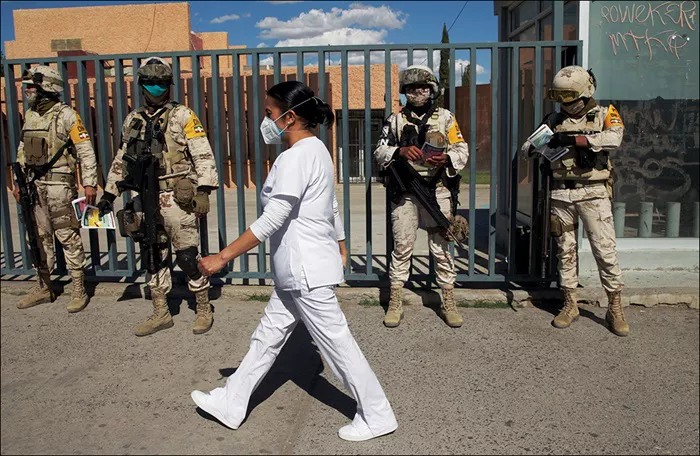August 18, 2024 – UNITED NATIONS, New York: Health and humanitarian workers are facing unprecedented levels of violence, with over 1,500 attacks on health facilities and more than 280 humanitarian workers killed in the past year. The violence has claimed the lives of at least 750 health workers and patients, not on traditional battlefields, but within hospitals, homes, and vehicles designed for the safe delivery of medical care.
The year 2023 set a grim record for casualties among health workers and patients, one that 2024 is poised to surpass. This escalating violence is global, spanning regions from Gaza to Myanmar, Haiti to Ukraine. Front-line workers, along with the vulnerable populations they serve, are being bombed, shot, kidnapped, tortured, and arrested, often while simply trying to do their jobs.
The response to this rising tide of violence has been largely characterized by impunity and inaction. Here are five crucial reasons why the international community must urgently protect health facilities, their patients, and the workers who serve them.
1. Violations of International Humanitarian Law
Attacks on health facilities, workers, and those seeking care are flagrant violations of international humanitarian law. In conflict zones, health workers and humanitarians are often the only lifeline for communities. Targeting these individuals and facilities not only results in immediate loss of life but also causes long-term damage to fragile health systems. Essential services such as medical appointments and surgeries are disrupted, leading to countless preventable deaths.
For example, during the chaotic aftermath of the foreign troop withdrawal from Afghanistan in August 2021, many health facilities closed or became non-functional due to the dangers faced by health workers. However, some, like the Ahangaran Family Health House in Bamyan Province, remained operational, thanks to the dedication of workers like midwife Mariza Ahmadi, who continued to serve despite the risks.
2. Impact on the Most Vulnerable, Especially Pregnant Women
In war and conflict zones, pregnant women face heightened risks as the health facilities they depend on are often under attack, inaccessible, or non-operational. Health workers themselves face extreme dangers, including arrest, kidnapping, and death, simply for trying to reach these facilities. In Gaza, for instance, more than 490 armed attacks on hospitals, clinics, and ambulances have decimated the health system, forcing women to give birth in dire conditions, often without essential medical supplies or support.
Dr. Mohamed Ragab, a gynecologist in southern Gaza, has witnessed this firsthand. After the Nasser Medical Complex was bombed, he was forced to continue his practice in a displacement camp, where a shortage of critical medications further endangers the lives of women and their newborns.
3. Sexual Violence Survivors Left Without Support
In crisis settings, gender-based violence often surges as the mechanisms designed to prevent and respond to it break down. In Haiti, for instance, where armed gangs are using sexual violence as a weapon, reports of rape increased by 50% between 2022 and 2023. Yet, with the national health system crippled by violence and health facilities under near-constant attack, only a fraction of rape survivors can access the crucial medical services they need within the first 72 hours.
The situation in Haiti is dire, with many health facilities forced to cease operations and nearly 40% of health workers leaving the country. As a result, essential care is scarce, and the most vulnerable, including survivors of sexual violence, are left with few options for support.
4. Normalization of Violence Against Health Workers
The failure to act against these attacks risks normalizing such violence, making it even more widespread and accepted. In Sudan, for example, there have been 88 reported attacks on health infrastructure since April 2023, with only one in four facilities in conflict zones fully functional. Health workers have gone unpaid for months, and many health centers have been looted, occupied, or attacked, leaving them unable to provide essential services.
Such conditions are unacceptable, yet they are becoming increasingly common in conflict zones around the world. The international community must recognize these attacks as intolerable and take decisive action to protect health workers and facilities.
5. Ambulances and Mobile Health Teams: Lifelines Under Threat
In many remote areas, ambulances and mobile health teams are the only means for people to access essential care, including life-saving maternity services and support for survivors of gender-based violence. However, these mobile units are also among the most vulnerable, often subjected to shootings, bombings, and looting.
For instance, in Ukraine, UNFPA mobile support teams have continued to operate under fire, despite the dangers. Psychologist Olena Kuznietsova recalls how a nearby factory was hit while her team was en route to a domestic violence shelter in Kharkiv, forcing them to seek refuge in a subway used as a bomb shelter.
A Call to Action
In 2023, UNFPA provided sexual and reproductive health services to some 14 million women, girls, and young people in crisis settings, helping 1.4 million women give birth safely. However, without the infrastructure and staff to support these programs, millions more could be left without vital care, exacerbating the risks they already face in violent and unstable environments.
As the world grapples with protracted conflicts, the places meant for healing have become targets, with little accountability for the perpetrators. On this World Humanitarian Day, global leaders are urged to take action—to protect those who risk their lives to save others and to uphold the principles of humanity in the face of escalating violence.
[inline_related_posts title=”You Might Be Interested In” title_align=”left” style=”list” number=”6″ align=”none” ids=”11473,11467,11545″ by=”categories” orderby=”rand” order=”DESC” hide_thumb=”no” thumb_right=”no” views=”no” date=”yes” grid_columns=”2″ post_type=”” tax=””]
































